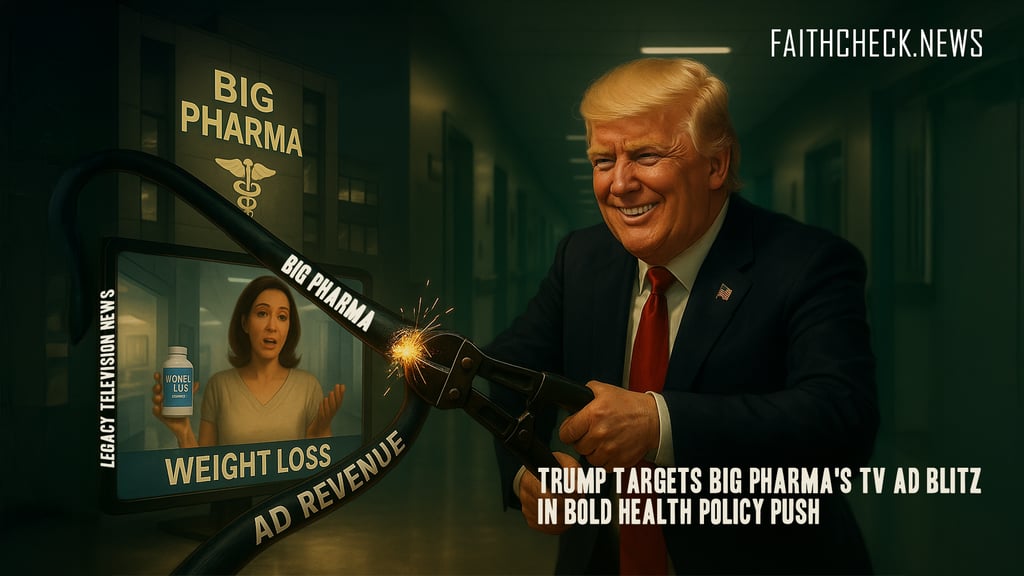Trump Targets Big Pharma's TV Ad Blitz in Bold Health Policy Push
Unlike Past Presidents' Empty Promises, Trump Takes Aim at Big Pharma's Ad Machine with Real Policy Moves
NEWS
6/17/20252 min read


The Trump administration is exploring new policies to curb direct-to-consumer (DTC) pharmaceutical advertising, a move that could significantly reshape the U.S. advertising landscape and score a major win for Health and Human Services Secretary Robert F. Kennedy Jr. According to sources familiar with the discussions, who spoke anonymously due to the sensitive nature of the plans, the administration is considering measures to make it more costly and complex for drug companies to market directly to patients.
The United States, alongside New Zealand, is one of only two countries where pharmaceutical companies are permitted to advertise prescription drugs directly to consumers. Kennedy, a vocal critic of this practice, has argued that it fuels overmedication in the U.S., driven by the pharmaceutical industry’s ability to influence consumer behavior and media coverage. During his presidential campaign, he pledged to issue an executive order banning pharmaceutical ads from television entirely.
However, an outright ban could trigger legal challenges, prompting the administration to explore alternative strategies. Two potential policies have emerged, according to insiders. The first would mandate more comprehensive disclosures of a drug’s side effects in advertisements, likely extending the length of broadcast ads and increasing production costs to prohibitive levels. The second would eliminate the tax deductions that pharmaceutical companies currently claim for DTC advertising expenses, creating a financial disincentive.
A Major Shift in Advertising
Such changes could disrupt an industry that ranks among the top spenders in U.S. advertising. Data from iSpot indicates that prescription drug brands accounted for approximately 13% of all ad spending on linear television in 2025, totaling $2.18 billion through early June. In 2024, the sector spent $3.4 billion on traditional TV ads between January and August alone, underscoring its dominance in the media market.
Since 1997, when the Food and Drug Administration eased disclosure requirements for DTC ads, pharmaceutical companies have increasingly relied on consumer advertising to boost demand. Current regulations require ads to disclose only a drug’s “most significant” risks, enabling concise and pervasive marketing campaigns. As a result, pharmaceutical ads have become a staple of U.S. media, comprising 24.4% of advertising minutes on evening news broadcasts across major networks like ABC, CBS, CNN, Fox News, MSNBC, and NBC through May 2025, according to iSpot. Kantar Media reports that on CBS Evening News, drug companies appeared in over 70% of commercial breaks.
Industry and Policy Implications
The proposed policies align with Kennedy’s long-standing critique of the pharmaceutical industry’s influence. By increasing transparency requirements or removing tax incentives, the administration aims to reduce the volume and impact of DTC ads without directly banning them, potentially sidestepping legal challenges. These measures could force drug companies to rethink their marketing strategies, possibly shifting focus to other channels or reducing overall ad spending.
As discussions continue, the administration’s next steps will likely face scrutiny from both the pharmaceutical industry and consumer advocacy groups. For now, the proposed changes signal a bold attempt to address concerns about overmedication and the pervasive influence of drug advertising in American life.
Sources: Bloomberg, iSpot, Kantar Media

Faith Check News
Curating daily news stories for Christian readers.
CONNECT OTHERS
© 2025. All rights reserved.
